CLICK ON IMAGES TO ENLARGE. REPEAT FOR FURTHER INCREASE IN SIZE.
Paul Clarke will tell you that my Streets of London series appears on a rainy day. It has surprised us all that today is one such. The garden, after such a long heatwave, has enjoyed the heavy rain we have received, but not the 50 m.p.h. winds.
Here is the view from the kitchen window this morning. Pauline’s light catcher did its job with what little there was.
Now to the Streets of London. Normally I scan the slides a dozen at a time. There are only eleven today because I thought I had lost those from after these of July 2005. Happily, afterwards, I remembered where the rest would be. They were among quite a number I had not yet put into storage files when Jackie came back into my life 10 years ago. The ex-librarian labelled their small processor’s boxes and I put them in a safe place. And we all know what happens to items that are put in a safe place.
My friends who lived in Islington’s Mountfort Crescent, told me that the shaded area at the pivotal point on this private drive concealed a medieval plague pit.
Barnsbury Park N1 contains a number of interesting architectural features, like the entrance porch in the first picture and the elegant doorway on the corner with Thornhill Road. You’d need upwards of £3,000,000 to buy a complete house in this area.
Belitha Villas is equally up-market.
Parliament Street SW1
leads to Parliament Square.
The Red Lion’s own website gives the following information: ‘The Red Lion stands on the site of a medieval tavern – known in 1434 as the Hopping Hall. The tavern passed through various hands and traded under many names in its early years, before it was bought by the Crown in 1531.
Centuries later, with the inn trading as The Red Lion, a young Charles Dickens became a regular visitor. Dickens’ noted that the pub’s landlady was a kind-hearted soul, whose attitude towards him was ‘admiring as well as compassionate’.
Standing so close to Downing Street and the Houses of Parliament, The Red Lion also became a popular haunt for British Prime Ministers. Indeed, the pub served every British Prime Minister up until Edward Heath in the 1970s – welcoming the likes of Sir Winston Churchill and Clement Atlee for a drink.
Situated between 10 Downing Street and the Houses of Parliament, the Red Lion is probably the best pub in the city for lovers of political history. There’s every chance you’ll catch a glimpse of some of our Government’s elite in the bar, too.’
‘This pub was established in around 1749 and rebuilt in 1899. ** It stands on the east side of Parliament Street, at the junction with Derby Gate (formerly Derby Street). The original pub is the one where 12-year old Charles Dickens asked for “a glass of your very best ale” – an incident immortalised in “David Copperfield”. The pulling-down of the old pub was widely regretted in the press, because of the Dickensian associations, and a bust of the author was placed above the second-floor bay window in the new building.’ (https://pubshistory.com/LondonPubs/WestminsterStMargaret/RedLion.shtml)
Downing Street needs no introduction from me. Our Prime Minister resides at No 10, while the Chancellor of the Exchequer occupies No 11, next door.
Further along Whitehall ‘The Monument to the Women of World War II is a British national war memorial situated on Whitehall in London, to the north of the Cenotaph. It was sculpted by John W. Mills, unveiled by Queen Elizabeth II and dedicated by Baroness Boothroyd in July 2005.’ There is much more information about the creation of this memorial on https://en.wikipedia.org/wiki/Monument_to_the_Women_of_World_War_II
Around the corner in Whitehall Court we find the Royal Tank Regiment’s memorial bearing on the base their motto ‘From Mud, Through Blood, To The Green Fields Beyond’.
I am indebted to the post of Sura Ark on Flickr for the following information: ‘The Royal Tank Regiment Memorial Statue was unveiled by their Colonel In Chief, the Queen herself, on 13 June 2000. Created by sculptor George Henry Paulin it features the five crew members of a Comet tank, the model introduced towards the end of World War II and which saw service right through until 1958. The Regiment itself was formed in 1917 – this fact is acknowledged in a small plaque that sits at the base of the statue depicting the Mark V tank which was used on the battlefields of Flers, the Somme. Amiens and elsewhere.’
This evening the three of us dined on Jackie’s excellent cottage pie; crunchy carrots, cauliflower and broccoli; and fresh runner beans. Jackie drank Hoegaarden and Elizabeth and I enjoyed Camiono del Angel Cabernet Sauvignon 2016.
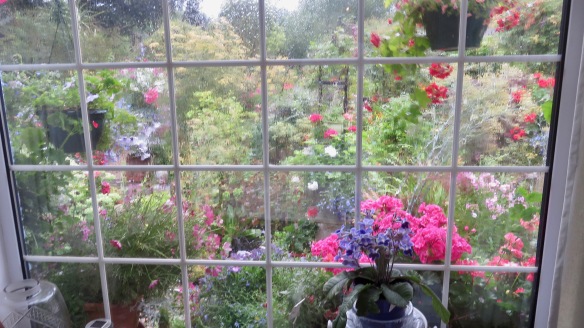

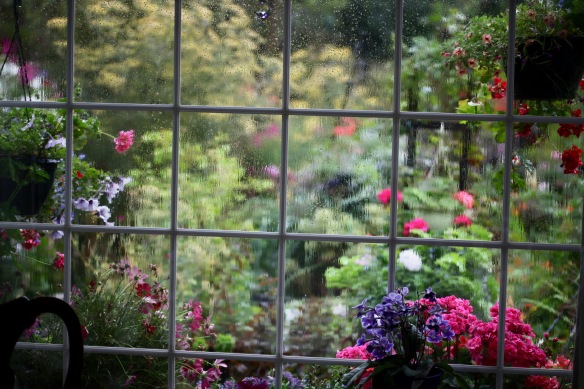
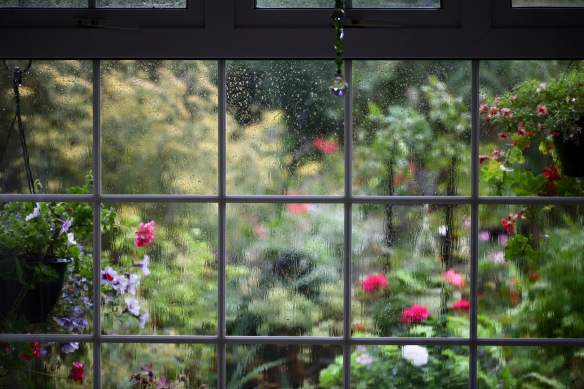
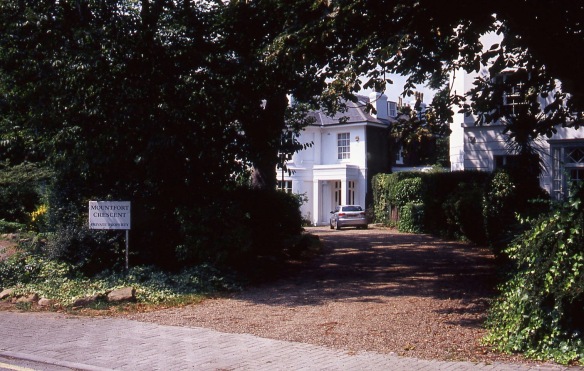


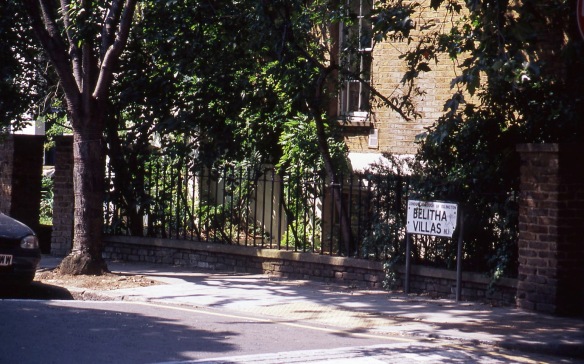
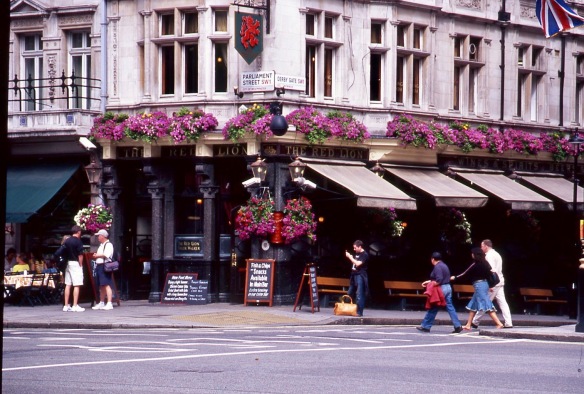
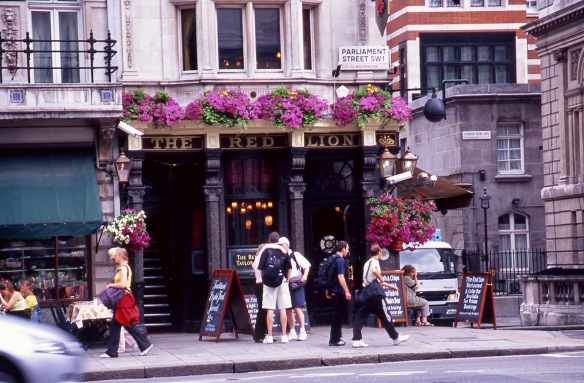
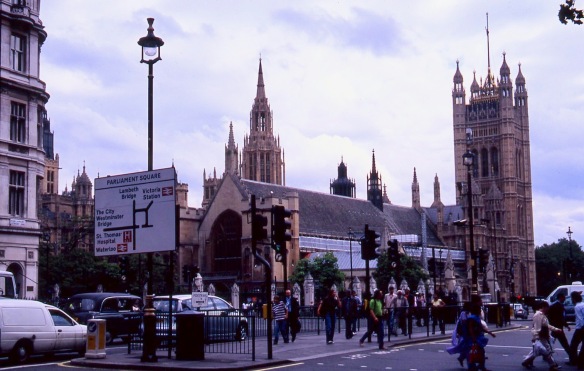
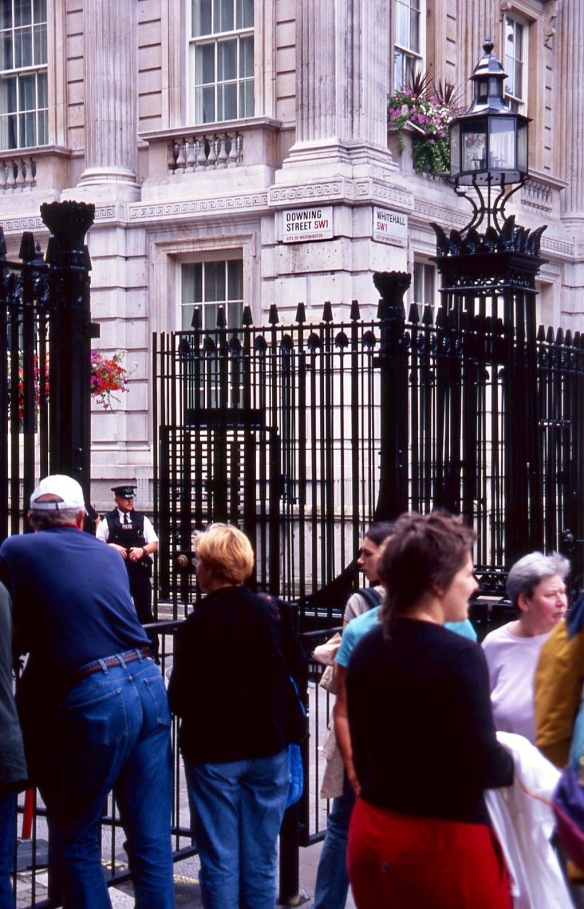


Wow very nice photos
Thanks very much Cinnamon
You’re welcome
The women of war is one of my favourites it’s so simple yet says so much x
Thanks very much, Chloe
wonderful mixed post – history – great images – and the garden being saturated – ahhhh
– loved your images – and also hope you do not get any high winds –
Thanks very much, Prior. The winds were strong. We will survey the damage tomorrow
fingers crossed
Fantastic trip to the streets, Derrick. I love your Parliament Street shots and the kitchen window!
Very many thanks, Jill
Love the images of the garden.
Thank you for the historical tour!
Thanks very much, Inese
Fascinating. I don’t remember ever seeing these last 2 memorials. Shows I haven’t been to Whitehall and surrounding area for a very time.
Thanks very much, Roland. I was surprised to learn that the Queen unveiled the Women one the very month I photographed it. Had I been a little earlier I may have missed it.
The view from the kitchen window even on such a day is still very beautiful! You know I did rather wonder if it had rained and kept you inside when I saw the post title. Last night I finished ‘The Golden Bird’. What a writer!! Thank you for sharing it with me xo
Very many thanks, Pauline 🙂 X
Your garden looks beautiful even in the rain–such bright colors through the window. I’m sure you’re happy for the rain, though not the wind. Thank you for another fascinating tour of London.
I know from reading Connie Willis’s novel, Doomsday Book, not to dig up a plague pit. 😉
Thanks very much, Merril. I don’t know that book. There must be hundreds of such pits.
It’s sci-fi, but I think of it as sort of a historical novel. Her historians actually go back in time. She has two other books that deal with WWII in England.
Thanks again
Love the kitchen window shots; no wonder I have always aspired to “an English Garden” look. So glad you got some rain; I hope the wind was kind.
What a great history tour. And the view from the kitchen window is a calming one…
Very many thanks, Lisa
Great pictures today, Derrick. My favorites were the 3 million pounds neighborhood. My gosh!
Many thanks, Cindy
What gorgeous views out your kitchen window this morning. Ahhhhh to see such beauty again out of mine. Love the post and of course all your photos! 🙂 <3 xoxoxo
Thanks very much, Natalie. I hope you get some rain soon
Thanks Derrick! I hope so too! Hugs and bless
Blessings, N ❤️❤️❤️
London is lovely. what great photos Derrick. And those window shots…beautiful!
Thank you very much, Arlene
This one of the ‘Sreets of London’ series is ale for the soul. You have immortalised it with the reference to Charles Dickens (whose bust I tried hard to have a peek at), and the accounts of World War II martyrs whose elegant statues uplift the neighbourhood.
Very many thanks, Uma. I’m pleased to have found the rest of the slides, so the series can continue for a while
Excellent tour and great narrative, you bring history to life through your posts Derrick
Many thanks, Ian
Two questions, Derrick: How is it that your garden looks even MORE beautiful on a rainy day, and who gets up on the roof to water the flowers on The Red Lion?
🙂 Thanks very much, Diane. Can’t answer either question, but lampposts throughout Westminster have similar high hanging baskets watered by a long pole thingy.
Thank you for the tour, Derrick!
Your gardens are always so beautiful, even in rain! Oh, I would love to have some of your rain. It has been bone dry here for some time now; grass has turned tan to almost white in many areas.
I do hope you get some rain soon, Lavinia. Thanks very much
It was a bit windy last night too. Thanks for the info on the pubs and the memorials. It was very interesting.
Thanks very much, John
Love the view outside your window Derrick. And that memorial looks wonderful.
Thanks very much, Drew
Thanks for the history.
Thanks a lot, Sherry
When I left Oz for London 44 years ago I came with the advice from a fellow teacher, “Do me a favour, John. Give London a second chance.” I didn’t have any idea what he meant. We weren’t all that impressed but we went away to Spain and France and then came back. It was like coming home. And I have loved it ever since even although I have only been back once since then. Thanks for all the memories. But please can you find a few pics of Sussex Gardens. And the children’s playground down near the Peter Pan Statue.
Thanks a lot, Paol. Will check, but I must have quite a few of Sussex Gardens
You put together a terrific post her, Derrick!! I’ve been putting together a new post for the women in WWII, can I steal this picture? I will give you credit for it
I’d love you to do that, GP. Very many thanks
I know the rain was much needed. Hope the wind didn’t do too much damage.
We got off very lightly, Laurie. Thanks very much
Good! I am starting to fear wind. Another of those things we never had to worry about in my younger days. The storms just weren’t as extreme.
Glad to see you got some rain. Interesting tidbit about plague pits. I had never heard that term before. Are they prevalent in London?
Many thanks Cheryl. https://www.historic-uk.com/HistoryMagazine/DestinationsUK/LondonPlaguePits/
Thanks!
That answers my question: there are quite a few! I have Peter Ackroyd’s London. I’m going to get it off the shelf and re-read it. I guess I must have forgotten about the pits. I keep stuffing too much in my brain:)
I forget so much that I read 🙂
Oh my, yes. Me, too!
“Government’s elite ” an oxymoron perhaps?
I don’t recall those gates and that fence at Downing Street, I seem to recall actually walking up to and looking at No 10 as a teenager.
Strange they used a Mark V and not the mark IV. The Mark IV saw more action I believe, starting at Cambrai, after which it became known as the Cambrai Tank
There is an original ‘Cambrai’ at the Nation War Museum in Canberra. There is also the rarest tank in the world; the German “Mephisto”, the only remaining German tank from the Great War/WWI
Thanks very much, Brian. We have become much more security conscious now.
Thank you for taking us along with you via your photos! I learned a few things I didn’t know before.
Those first few pictures of the rain on the window panes are so lovely!
HUGS!!! 🙂
Many thanks, Carolyn X
‘From Mud, Through Blood, To The Green Fields Beyond’.!!!!!!!!!!!!!!!!
Reflecting the colours of the regiment. Thanks very much, Efi
Interesting War Memorials. I always enjoy your tours of London.
Thanks very much, Quercus